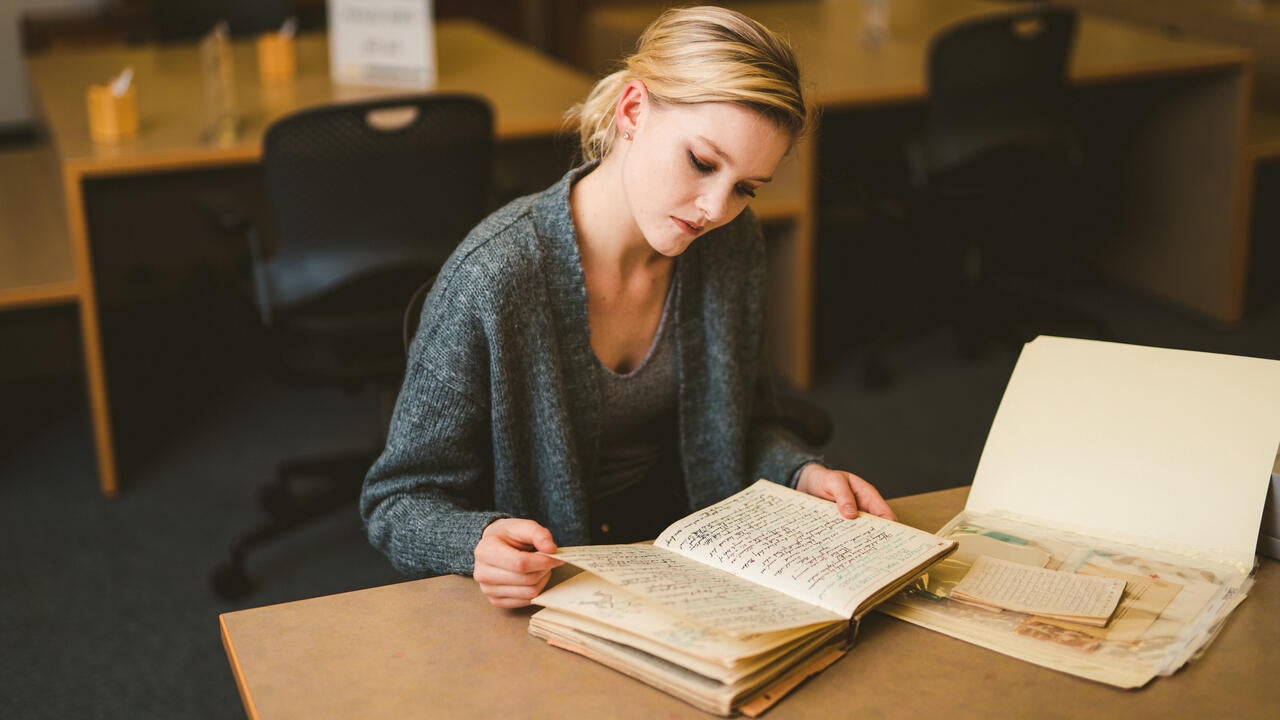
Setting the record straight
A gift to Waterloo’s Library gives students ‘a direct connection’ to the lives of WWII POWs.

A gift to Waterloo’s Library gives students ‘a direct connection’ to the lives of WWII POWs.
By Beth Bohnert Office of AdvancementIt’s been said that history is written by heroes. But for Waterloo student Anna Good, it’s the stories of ordinary people living through unusual times that truly make the past come alive.
People like Cameron (Cam) Hill, a young airman who served with the Royal Canadian Air Force in World War II. Through Hill’s diary – part of a collection donated to the University’s Library – Anna found a window into the lives of Canadian prisoners of war (POWs). She learned how they struggled to survive captivity – and overcome the slurs of their fellow-citizens. In fact, the diary became a central resource in Anna’s research into the damage inflicted on POWs by distorted public perceptions.
Hill was shot down during a bombing raid in North Africa in 1942. He spent the rest of the war in a series of prison camps, ending with a final forced march with his fellow POWs through Germany. In 1945, he returned home to Kitchener, Ontario, where he raised a family and became a successful businessman and community leader.
According to Hill’s daughter Barbara, he never spoke about the war. But she and her brothers knew of his ‘war box’ under the cellar stairs, a trove of artifacts and photographs that detailed his time as an airman and a POW. In 2017, Barbara wrote a book about her father’s experiences for her nieces, nephews and Cam’s grandchildren, and donated copies to local libraries. Still, she thought more could be done to share his story with others.
“Our family decided to donate the collection to the Library,” Barbara said. “We felt that Special Collections & Archives (SCA) was the only place these items would be readily available to researchers and students.”
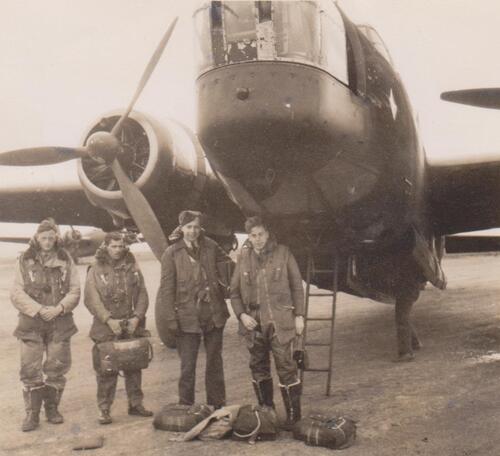
Cameron Hill (far right) and his crewmates in April 1942.
It was on her first visit to the SCA that Anna, a fourth-year history student with a special interest in the psychological effects of warfare, came across Hill’s diary.
One of the things that struck her on reading it was the jarring contrast between his reality as a POW and the public’s perception of prison camp life. On one page, Hill described how his weight had plummeted to 120 pounds on rations consisting of flour and water. On another, he wrote how a friend in Canada had asked if Hill had met his relatives in Germany, “as if POWs were gallivanting around Europe,” Anna said.
Even darker, “there were comments that emerged as new prisoners entered the camp: that people back home thought POWs were cowardly and should never have allowed themselves to be captured,” she added.
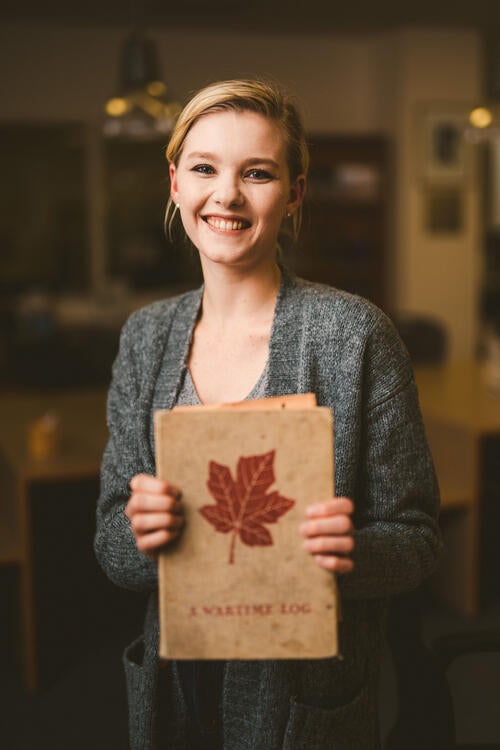
ANNA GOOD, history student
Working so closely with the diary made me realize how many voices from war are not heard. But these voices allow us a deeper understanding of individual experiences.
That faulty perception, fed by propaganda on both sides that depicted happy POWs playing sports and learning to cook, was understandable. But it was difficult for prisoners like Hill who had served and suffered for their country.
“It’s as if, through his diary, he helps to set the record straight,” Anna said. And indeed, she notes that the diary’s pages are filled with courage, resilience and even joy; Hill recalled savouring a small square of chocolate, his portion of a Red Cross parcel shared with 20 other men.
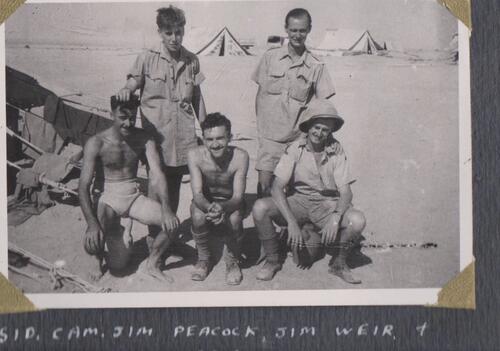
Hill (top left) and fellow prisoners in a POW camp in Egypt.
“The diary is really beautiful in that way,” Anna said. “We know how much he struggled, but he was determined that life was going to go on.”
“Eyewitness accounts like this provide a direct connection with history,” she added.
“Working so closely with the diary made me realize how many voices from war are not heard. But these voices allow us a deeper understanding of individual experiences. I’m so grateful that Cameron Hill’s family donated the collection and I’m honoured to have experienced it.”
Photos of Anna by Liam Good. Used with permission.

Read more
A Waterloo couple reflects on the campus that shaped their careers, their values, and their love story

Read more
To meet our AI ambitions, we’ll need to lean upon Canada’s unique strengths
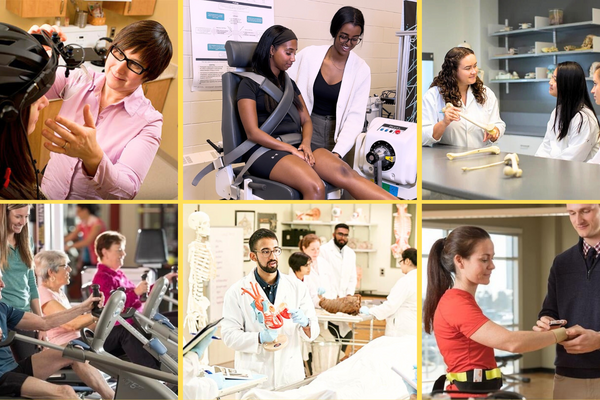
Read more
From optometry and pharmacy to public health and therapeutics, Waterloo alumni are powering Canada’s health care sector
The University of Waterloo acknowledges that much of our work takes place on the traditional territory of the Neutral, Anishinaabeg, and Haudenosaunee peoples. Our main campus is situated on the Haldimand Tract, the land granted to the Six Nations that includes six miles on each side of the Grand River. Our active work toward reconciliation takes place across our campuses through research, learning, teaching, and community building, and is co-ordinated within the Office of Indigenous Relations.